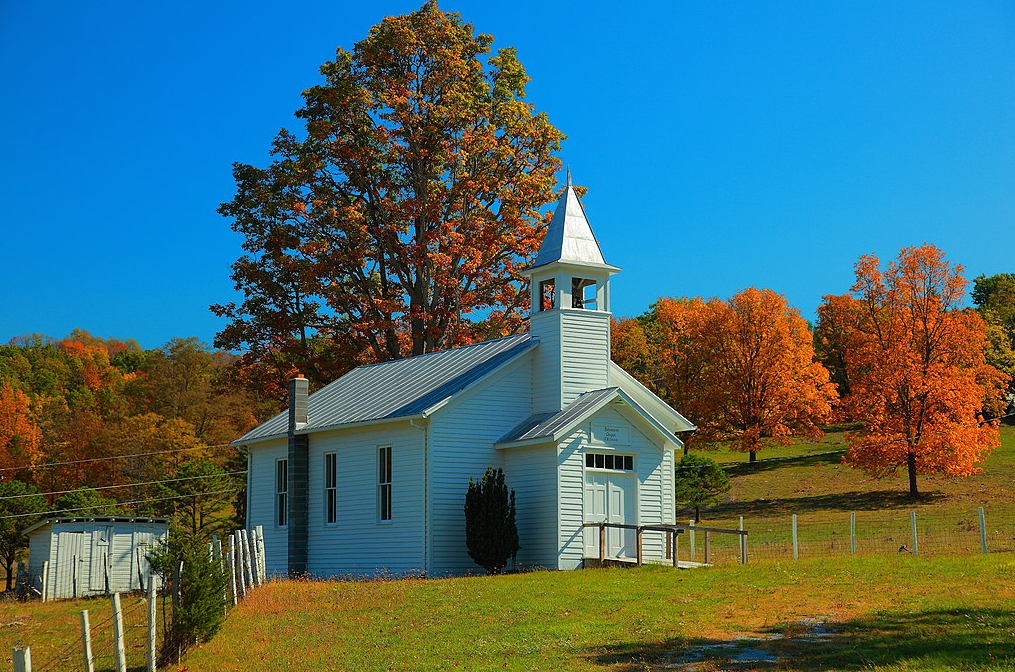What is a Fifth Sunday Sing? Well, don’t feel bad if you don’t know. This probably means you grew up someplace like Sacramento. Or worse, Queens.
For the unbaptized, Fifth Sunday Sings were started in the pioneer days. Back then, rural Americans couldn’t make it to church every Sunday. Back then, America had 32 million farmers. So churches had “all-day sings,” usually every fifth Sunday.
After four Sundays, homesteaders traveled miles into town, camped out on the church grounds, brought food, and spent the Sunday hanging out. Singing. Eating.
They’d shake each other’s hands and say, “I haven’t seen you in a month of Sundays, Carl.” Some called them “camp meetings.” Or “dinner on the grounds.”
No matter what you call them, they still happen. Although they are rare.
Food has always been central to these quintessential small-church gatherings. Every woman brings her ace dish. She places her dish on a long table, alongside the others, and everyone eats until their feet swell and their ears ring.
I was a chubby child, and this is exactly the reason why. We did fifth Sunday sings. And I was always first in line for any potluck. Although my fundamentalist brethren did not call them “potlucks.” We called it a “pot providences.” We did not believe in luck. Luck was for heathens, reprobates, and Presbyterians.
Right now, I am at a fifth-Sunday-sing potluck at Pleasant Hill Baptist in Slocomb, Alabama. And I’m experiencing all the old feelings from childhood.
Today, Sister Annette has made chicken and dumplings. The old way. With hardboiled eggs. Miss Annette insists there is nothing special about her dumplings. She says it’s “Just homemade chicken broth, rolled dumplings, and hard boiled eggs.” No big deal, she says.
But here’s the thing. Miss Annette has no idea that, today, young women don’t hand-roll dumplings. In fact, people don’t prepare anything homemade anymore.
I read a recent study that said fewer Americans are home-making anything. This includes clothes, furniture, food, or music. We buy it from Walmart. Or from Amazon.
But today, in this tiny fellowship hall, all is homemade. The fellowship hall, for example, was built by men in this community, back in the mid-1970s. Likewise, there are women here wearing skirts and two-piece jacket dresses they sewed themselves.
The food, too, is assembled by hand. Even the chicken spaghetti, the dumplings, and the field peas.
And the music tonight, it is not canned. It comes from the red-back hymnal. There is no praise team. No electric guitars. No fog machines. Only a congregation. A fiddle. A mandolin. A banjo.
And I’m remembering gentler times. Times when people weren’t careful to be politically correct. When Instagram and TikTok weren’t a thing. When the only “text message” you ever heard about was the one the preacher delivered. And the only cell phones were the ones in Draper Correctional Facility.
In this nanoscopic hall, the blessing beforehand takes a full 20 minutes, because we have to pray for the infirm and the elderly. The tea is sugary enough to give you type-two diabetes. Children are playing tag outside. Old men are doing dishes. Elderly women are fixing plates for the shut-ins.
And when it’s time to sing, we all gather into the small sanctuary at First Baptist and sing until our chests are numb.
We sing the hymn I once sang at my father’s funeral. The same song I could not finish singing because I broke down and cried until I was incapacitated. “Will the Circle Be Unbroken?”
I’ll never forget when a woman in our congregation sidled next to me. I was weeping until snot came from my nose. She let me cry into her bosom.
She prayed for me in a whisper. She said, “Lord, comfort this child.” She held me for a full hour as rural voices sang. And then everyone in the room took turns hugging me, weeping alongside me, offering silent prayers for the tragic boy that I was.
It was the most warm memory of my lifetime. There was no judgment. No dogma. Only the sweetness of family and strangers.
And that, my dear friend, is a Fifth Sunday Sing.
Sean Dietrich is a columnist and novelist known for his commentary on life in the American South. He has authored nine books and is the creator of the “Sean of the South” blog and podcast. The views and opinions expressed here are those of the author and do not necessarily reflect the policy or position of 1819 News. To comment, please send an email with your name and contact information to Commentary@1819News.com.
Don’t miss out! Subscribe to our newsletter and get our top stories every weekday morning.










